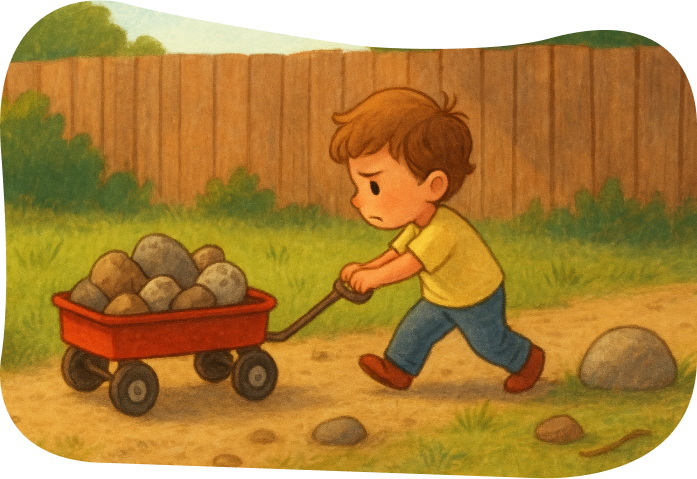
You watch your child play and think it’s just fun. A pile of blocks, a wagon of rocks, or a backyard treasure hunt. But if you look closer, something bigger is happening. Play isn’t only play. At some point, it shifts. A game turns into a lesson.
The question is: when does that happen?
When They Carry More Than They Can Handle
Think about a child filling a wagon with rocks. At first, it’s exciting. Every rock feels like a win. But after a while, the wagon gets heavy. They stop. They pull harder. They rest.
Here’s the thing: that’s a life lesson right there. They’re learning what it feels like to carry too much. They’re realizing weight slows them down. And for you as a parent, it’s a reminder too. Your own “rocks”, worries, work, bills drag you down in the same way.
So a game of collecting rocks teaches balance, limits, and the value of letting go.
When Curiosity Turns Into Questions
Children rarely just play silently. They ask questions along the way.
“Why is this rock shiny?”
“Why does it have holes?”
“Could a dinosaur have seen it?”
That curiosity is play stretching into learning. The rock isn’t just a rock anymore. It’s a mystery. A puzzle to solve. And this is where a child’s game becomes a tool for thinking.
As adults, we sometimes forget to wonder. We want quick answers. Kids remind us that the questions matter as much as the answers.
When Imagination Builds Meaning
A stick becomes a sword. A blanket becomes a cape. A rock becomes a dragon egg.
Children don’t need instructions to turn simple objects into stories. Through that process, they’re learning to see possibility where others see nothing. That’s not just a game, it’s creativity in its purest form.
And for you, it’s a lesson too. You don’t always need something new or expensive to find joy. Sometimes imagination is enough.
When Sharing Matters More Than Winning
A child often runs to show you what they found or built. The point isn’t the rock, the tower, or the drawing. The point is you noticing.
That moment of sharing turns play into connection. And that connection teaches your child something huge: joy grows when it’s shared.
For parents, this lesson stings a little. How often do you rush past your child’s “look what I made”? But those moments are their way of saying: “See me. Be part of this with me.”
When Ordinary Becomes Important
The truth is, children don’t always know they’re learning. They just know they’re playing. But somewhere between stacking, collecting, or pretending, they carry lessons that stay.
So when does a game become a lesson? It’s in those small shifts, when fun turns heavy, when objects spark questions, when imagination creates stories, when sharing connects hearts.
Final Thought
As a parent, you don’t always have to “teach.” Sometimes you just need to notice. Because a child’s game doesn’t stay a game forever. One day, you’ll realize they weren’t just playing with rocks or toys. They were practicing life.
Quick Links
Useful Links
Copyright © 2025 Karen Sullivan. All Rights Reserved.